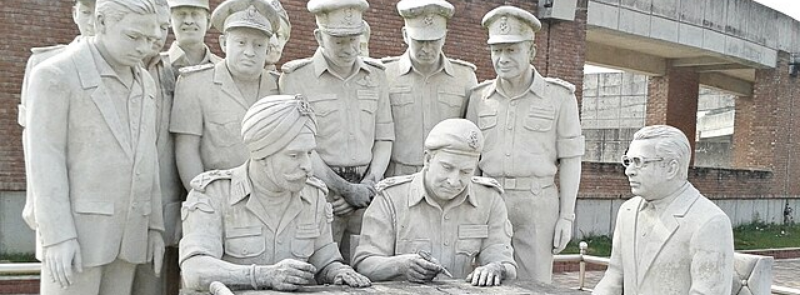
When It Occurs
Every December 16th
Timeline
Days Passed (799)
# Hashtags
#VijayDiwas #VictoryDay
Vijay Diwas (Victory Day) is celebrated annually in India on December 16th to commemorate the victory of the Indian Armed Forces over Pakistan in the 1971 Indo-Pak War, which led to the creation of Bangladesh. It marks a significant moment in Indian military history when Pakistan's Eastern Command surrendered, resulting in the independence of East Pakistan, now Bangladesh.
Historical Background
The Indo-Pak War of 1971, one of the shortest wars in history, lasted just 13 days, starting on December 3 and ending on December 16, 1971. The war was a result of the political and humanitarian crisis in East Pakistan (now Bangladesh), where the local population was subjected to severe oppression by the Pakistani military, leading to widespread displacement and the influx of millions of refugees into India.
The conflict escalated when India, under Prime Minister Indira Gandhi, decided to intervene in support of the Mukti Bahini, the Bangladeshi nationalist forces fighting for independence. India’s intervention was primarily humanitarian, aiming to stop the atrocities and mass displacement, and to assist in the liberation of East Pakistan.
On December 16, 1971, the Pakistani military surrendered unconditionally to the Indian Armed Forces, led by General Sam Manekshaw (later Field Marshal). Lt. General A. A. K. Niazi of the Pakistani Army signed the Instrument of Surrender in Dhaka, marking a decisive victory for India and the birth of Bangladesh. Approximately 93,000 Pakistani soldiers were taken as prisoners of war, making it one of the largest surrenders since World War II.
Significance of Vijay Diwas
Vijay Diwas is a day to honor the bravery, valor, and sacrifice of the Indian soldiers who fought in the 1971 war. The day is also celebrated to express solidarity with the people of Bangladesh, commemorating the beginning of their independence and the strong ties between the two nations.
The victory highlighted India's military capabilities and diplomatic resolve, while also reshaping South Asian geopolitics. It also emphasized India's humanitarian role and commitment to the liberation of oppressed people.
Celebrations and Observance
-
Tributes and Memorial Ceremonies: Vijay Diwas is observed across India, especially in military establishments. Key ceremonies take place at the National War Memorial in New Delhi, where the President, Prime Minister, military chiefs, and other dignitaries pay tributes to the soldiers who laid down their lives in the 1971 war. Wreath-laying ceremonies are conducted at war memorials across the country.
-
Parades and Military Honors: Various military establishments organize parades, events, and remembrances in honor of the armed forces' role in the 1971 victory. Veterans who fought in the war are often honored, and their stories of valor and sacrifice are shared to inspire future generations.
-
Cultural Programs and Documentaries: Documentaries, films, and television programs about the Indo-Pak War of 1971 are aired to educate the public about the significance of the day and the events leading to the creation of Bangladesh. Cultural programs showcasing the history of the war are also organized in schools and colleges.
-
Bangladesh-India Relations: Vijay Diwas is also celebrated in Bangladesh as Bijoy Dibos (Victory Day). Joint military exercises, cultural exchanges, and diplomatic events between India and Bangladesh underscore the enduring friendship and cooperation between the two countries.
Role of Key Figures in the 1971 War
-
General Sam Manekshaw: As the Chief of the Indian Army, General Sam Manekshaw was instrumental in planning and executing the military operations that led to India's victory. His strategic foresight and leadership played a critical role in the swift outcome of the war.
-
Prime Minister Indira Gandhi: Indira Gandhi's diplomatic efforts to gather international support for India's intervention and her firm resolve to assist in the liberation of East Pakistan were crucial. Her leadership strengthened India’s stance as a regional power.
-
Lt. Gen. Jagjit Singh Aurora: He was the General Officer Commanding-in-Chief of the Eastern Command of the Indian Army, who accepted the Pakistani Army's surrender on December 16, 1971.
-
Air Chief Marshal P.C. Lal and Admiral S.M. Nanda: The Indian Air Force and Navy played critical roles in conducting successful air and naval operations, ensuring India's dominance in the war.
Impact of the 1971 War
-
Creation of Bangladesh: The war ended with the creation of Bangladesh, a new sovereign nation with its own identity, separate from Pakistan. This was a historic geopolitical shift in South Asia.
-
Strengthening of India’s Military: The victory in 1971 solidified India’s reputation as a strong military power in the region. It also led to increased national pride and confidence in the capabilities of the Indian Armed Forces.
-
Diplomatic Success: India's role in the liberation of Bangladesh and its humanitarian intervention were praised by many countries, although there were also challenges in navigating the complex geopolitical landscape, especially with Pakistan’s allies, including the United States and China.
-
Humanitarian Crisis and Refugees: The war was largely a response to the humanitarian crisis in East Pakistan. Millions of refugees fled to India to escape the violence in East Pakistan, creating a massive refugee crisis that contributed to India's decision to intervene.
Legacy of Vijay Diwas
Vijay Diwas remains a poignant reminder of the sacrifices made by the Indian military and the suffering of the people of East Pakistan. It is a day of pride, unity, and remembrance, not just for the military success, but also for the humanitarian principles that guided India’s involvement in the conflict.
Each year, the day strengthens the bond between India and Bangladesh, while also honoring the memory of the brave soldiers and civilians who played a role in shaping the history of South Asia.
Conclusion
Vijay Diwas is a symbol of India's military strength, leadership, and commitment to upholding justice and human rights. The 1971 Indo-Pak War, culminating in the creation of Bangladesh, remains one of the most significant chapters in India's history, celebrated every year on December 16 to honor those who contributed to this victory.


